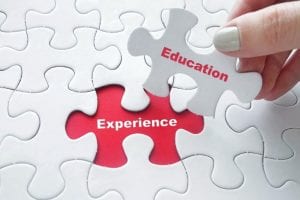It’s a well-known fact that education is good for employment. Comparing high school dropouts and college graduates, incomes increase by 90% on average, proving that four years and a bit of student debt can be a worthwhile investment. However, what is often disputed is the source, scope, and extent of that education – and how, exactly, it affects a student’s lifelong career.
 If you are at a turning-point in your career, you might be considering returning to school for advanced credentials. Yet, with an equal amount of experts arguing for and against education, the decision to gain a master’s degree (and beyond) is a difficult one. The truth is education often matters — but so does experience, in certain circumstances.
If you are at a turning-point in your career, you might be considering returning to school for advanced credentials. Yet, with an equal amount of experts arguing for and against education, the decision to gain a master’s degree (and beyond) is a difficult one. The truth is education often matters — but so does experience, in certain circumstances.
When Education Matters
When employers and customers need a guarantee of a certain proficiency in service, they often turn to your education history to understand your level of skill and knowledge. Plus, certain professional licenses and certifications often require education to obtain, which means you might not be able to secure any jobs in your preferred field without a few years of schooling.
It is important to remember that an education is more than an academic pursuit, and most employers are well-aware of the unsung benefits of hiring educated employees. In addition to familiarity with job-appropriate tools and techniques, students tend to boast positive personality traits that are advantageous to employers. For example, education requires commitment and diligence as well as interest and passion. If you succeed in achieving an online accredited MBA, many employers will note your powerful self-motivation, adept time management, and your shrewd decision-making – and likely offer you a job straightaway.
Education is never valueless, but it tends to be especially useful when you are young or changing careers. Through a degree program, you can gain skills and knowledge that would otherwise take decades to accrue. Thus, with the right degree, you can get a jump-start in a foreign field and begin your career closer to success.
When Experience Matters
 Education is excellent for acquisition of comprehensive skills and knowledge, but to do a job well, you typically need dexterity in incredibly specific tasks. Even within industries – even within career fields – not all employers accomplish goals the same way, and wide-ranging experience can provide you will more nuanced abilities than education is likely able to provide. The real- world changes more quickly than the academic environment, so some fresh grads encounter work that is entirely dissimilar to what they practiced in school. For example, as new technologies impact how businesses function, professionals must often alter how they complete their tasks. Because educational institutions can hardly predict which technology will evolve and affect your future career, you likely won’t encounter emerging tools and techniques until you gain real-world work experience.
Education is excellent for acquisition of comprehensive skills and knowledge, but to do a job well, you typically need dexterity in incredibly specific tasks. Even within industries – even within career fields – not all employers accomplish goals the same way, and wide-ranging experience can provide you will more nuanced abilities than education is likely able to provide. The real- world changes more quickly than the academic environment, so some fresh grads encounter work that is entirely dissimilar to what they practiced in school. For example, as new technologies impact how businesses function, professionals must often alter how they complete their tasks. Because educational institutions can hardly predict which technology will evolve and affect your future career, you likely won’t encounter emerging tools and techniques until you gain real-world work experience.
While it might be frustrating to find entry-level positions demanding several years of industry experience, the truth is employers rarely expect much experience from younger professionals. In truth, extensive relevant experience is only truly important to older job-seekers, who have had plenty of time to obtain education and work in their chosen field.
How to Get Both
Ultimately, it doesn’t matter whether you are young or mature or whether you are more interested in accruing education or experience. Because both education and experience are important for obtaining a job, you must be willing to devote time and effort to both pursuits regardless of your age.
Fortunately, this is more possible than many believe. Thanks to affordable, accessible online education, professionals can continue learning even while they gain industry experience. Additionally, internships and shadowing opportunities allow you to try out different industries and careers, gaining resume-worthy experience without committing to a year or two of employment – and usually earning credits that can help you obtain a practical degree. Both education and experience enhance your career, you should try to obtain them in equal measure.
When Neither Will Get You the Job
While education and experience are vital elements of your resume, they aren’t what ultimately secure you a job. Solid application materials will get you an interview and prime your prospective employer with the benefits of hiring you, but it is your demeanor during the interview that will make or break your employment. Though you can talk up your education credentials and your past work experience, you should also exude positive personality traits that complement each distinct workplace environment. Then, you will surely succeed in whichever career you choose.
